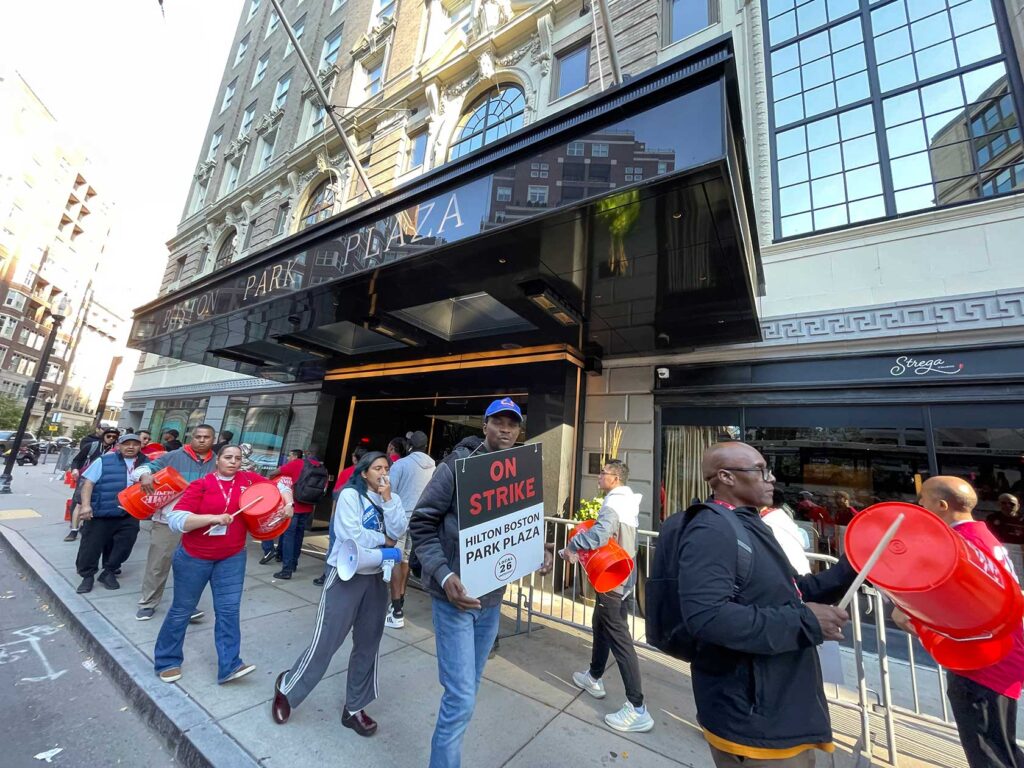
Visitors to Omni and Hilton hotels in Boston are being met by 24-hour picket lines as more than 1,200 local workers strike as part of a national push for better wages.
The strike, organized in Boston by the union UNITE HERE Local 26, comes as cooks, cleaners and desk attendants face growing costs of living.
“My rent is going up,” said housekeeper Candace Rogers, who last week picketed in front of the Park Plaza Hilton hotel. “Dorchester is expensive now. After you pay for gas and day care, if feels like you barely see your check.”
Hotels, like many industries in the U.S., took a hit during the COVID pandemic as lockdowns and the absence of business conferences and tourism dried up demand for rooms. While business is back up now, hotel workers say they need higher wages to live within commuting distance of their places of work.
The wave of hotel strikes has hit across the U.S., including in Hawaii, Seattle, San Diego, San Francisco, Providence and New Haven. While some locals have struck deals with hotels, currently there are more than 6,000 workers striking across the U.S., including those in Boston.
The strikes have led hotels to cut back on services, union officials say, leading to longer check-in lines, lack of food service and lack of access to clean linens and towels.
Carlos Aramayo, President of UNITE HERE Local 26, said the Boston strikes have sent a strong message to the Hilton and Omni hotel chains.
“We’re always willing to negotiate, but at the end of the day, we need a contract where people can afford to live in the city,” he said, standing in front of the Park Plaza hotel where several dozen members marched in a picket line at the front door.
For cook Kevin Haynes, that ship has sailed. He recently moved from his Mattapan apartment to Norwood, where rent is more affordable.
“We work in the city of Boston,” he said. “We should be able to afford to live in the city of Boston.”
While pay for room attendants at the Hilton and Omni hotels averages about $28 an hour, to afford a two-bedroom apartment in Boston, they would have to earn $42 an hour, according to the National Low Income Housing Coalition. Low-income workers are contending with a 21% increase in the cost of living since before the pandemic struck in 2020 — much of that driven by increasing rents and food costs.
Locally, union officials have been negotiating for higher wages and more manageable workloads since April. The waves of strikes began in September, with 2,500 workers at 36 hotels participating that month.
The hotel workers are not alone in their demands for higher wages. More than 450,000 workers were involved in work stoppages last year — a 280% increase over the previous year.
This year’s hotel worker strikes appear to have made a difference. In San Diego, Providence and New Haven, union locals reached deals with the hotels they were striking against. In Boston, Aramayo says, he thinks the strikes will bring hotels to the bargaining table.
“We have extremely high participation,” he said. “We’ve sent a strong message to Hilton. If you stay out and stay strong, you get the deal you want.”
Last week, Aramayo said, local activists and members of a flight attendants’ union joined the hotel workers in the picket. A group of physics students who are members of a graduate student union refused to cross the picket line to attend a conference in the hotel.
“They joined the picket line rather than attend the conference,” Aramayo said.







